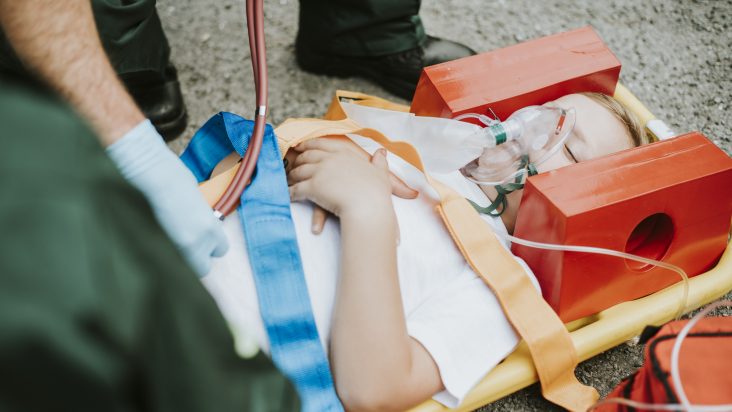Few things are more shocking than hearing about a healthy-looking child collapsing during sports or physical activity. In rare cases, the cause is sudden cardiac arrest (SCA)—an event where the heart suddenly stops beating due to a serious rhythm problem. While this is uncommon in children, it’s not unheard of. And for many families in the UAE, the question becomes: Could it have been prevented?
At KidsHeart, we believe awareness, early screening, and timely intervention can make a lifesaving difference. Here’s what every parent in Dubai, Abu Dhabi, or Al Ain should know.
What Is Sudden Cardiac Arrest?
Sudden cardiac arrest happens when the heart’s electrical system malfunctions, causing the heart to beat dangerously fast or stop altogether. Blood flow to the brain and other vital organs stops instantly, and without immediate treatment, SCA can be fatal within minutes.
Unlike a heart attack—which is caused by a blockage in blood vessels—SCA is usually related to electrical or structural problems within the heart.
How Common Is It in Children?
Although SCA is far more common in adults, it does occur in children and teens, particularly those involved in sports. Studies estimate that sudden cardiac arrest occurs in about 1 in every 100,000 to 300,000 young athletes per year. While these numbers are low, the impact is devastating when it happens unexpectedly.
Many cases involve undiagnosed congenital heart conditions, which is why early screening is so essential.
The Role of Family History
One of the strongest predictors of a child’s risk is family history. If you or a close relative has experienced:
- Sudden cardiac arrest or unexplained death under age 40
- Fainting during exercise
- Known heart rhythm disorders (like Long QT Syndrome)
- Inherited cardiomyopathies (like hypertrophic cardiomyopathy)
…it’s critical to get your child screened—even if they show no symptoms.
Our Sudden Cardiac Death Risk Assessment service is designed specifically for these cases. It includes a thorough review of family medical history and a set of non-invasive tests to evaluate potential risk.
Warning Signs to Never Ignore
While many children with heart conditions show no outward symptoms, others may have subtle signs that go unrecognized. Parents should always take note of:
- Fainting (syncope), especially during exercise or emotional stress
- Chest pain or tightness during physical activity
- Palpitations or irregular heartbeats
- Unexplained fatigue or shortness of breath
- A sibling or cousin with a known cardiac issue
These symptoms can sometimes be mistaken for dehydration, anxiety, or stress—especially in hot climates like the UAE. But they should always be evaluated by a pediatric cardiologist.
Explore related services like Syncope Evaluation and Chest Pain in Children to understand more.
What Happens During a Risk Assessment?
At KidsHeart, we make the screening process simple and child-friendly. A typical SCA risk assessment may include:
- A detailed interview about family and personal health history
- Physical exam with focus on heart and blood pressure
- Electrocardiogram (ECG) to detect electrical rhythm problems
- Echocardiogram (heart ultrasound) to assess heart structure
- In some cases, a stress test or Holter monitor
These tests are non-invasive and pain-free, and they provide critical information that could guide life-saving decisions.
Why School-Aged Kids and Athletes Are at Higher Risk
Children who are very active, particularly those in competitive sports, may unknowingly trigger symptoms related to underlying heart conditions. In many UAE schools and sports academies, physical performance is encouraged—but often without proper medical screening beforehand.
This is why our Sports Participation Heart Health evaluations include cardiac fitness assessments, ECGs, and stress testing when needed—ensuring children can participate safely.
Can Sudden Cardiac Arrest Be Prevented?
In many cases, yes.
While we can’t prevent all forms of SCA, early detection and proper management of risk factors significantly reduce the chances of an unexpected cardiac event. Children diagnosed with conditions like hypertrophic cardiomyopathy, Long QT syndrome, or arrhythmias can often be treated with:
- Lifestyle adjustments (e.g., modifying physical activity)
- Medications to control heart rhythm
- In some cases, implantable devices like pacemakers or defibrillators
- Regular follow-ups and cardiac monitoring
Our Pediatric Arrhythmia Management and Pacemaker Monitoring services are tailored to children’s developmental needs, ensuring ongoing safety as they grow.
What Parents in the UAE Can Do
You don’t need to wait for symptoms or a referral. If your child:
- Has a family history of cardiac conditions or sudden death
- Experiences unusual symptoms during exercise
- Is about to join a sports team or training program
…it’s wise to schedule a preventive screening. The peace of mind it provides is well worth the visit.
In a place like the UAE, where children are highly active year-round, routine heart checks are a practical, proactive way to protect your child’s health.
We’re Here to Help
At KidsHeart, our Pediatric Cardiology team across Dubai, Abu Dhabi, and Al Ain is experienced in identifying and managing heart rhythm risks in children. Our goal is not to restrict activity—but to make sure it’s safe and sustainable.
If you’re unsure whether your child should be screened, talk to one of our pediatric cardiologists. Together, we can take the right steps—before there’s ever a need for emergency care.

